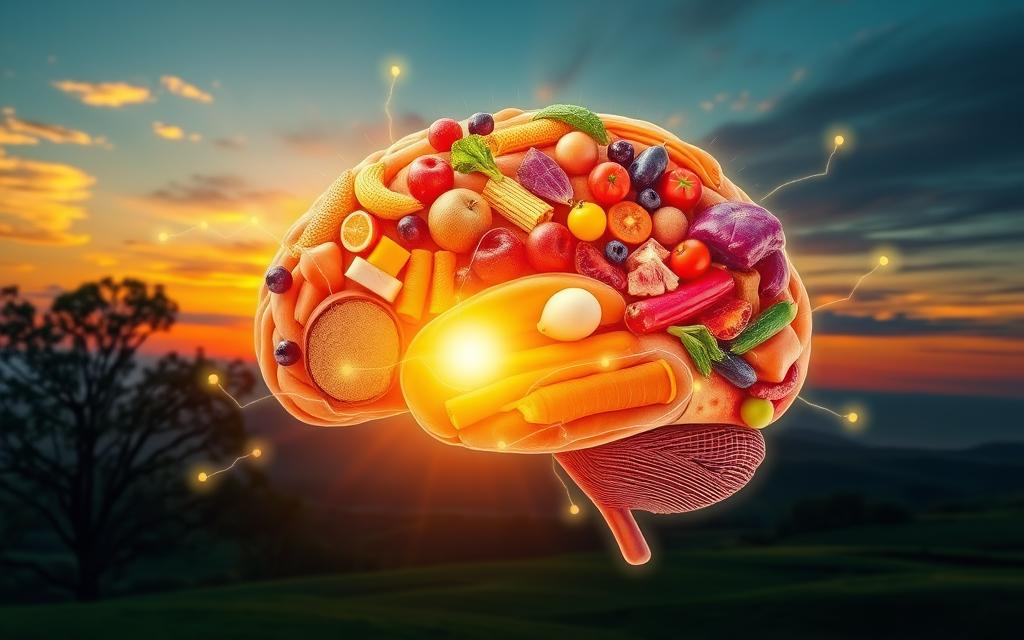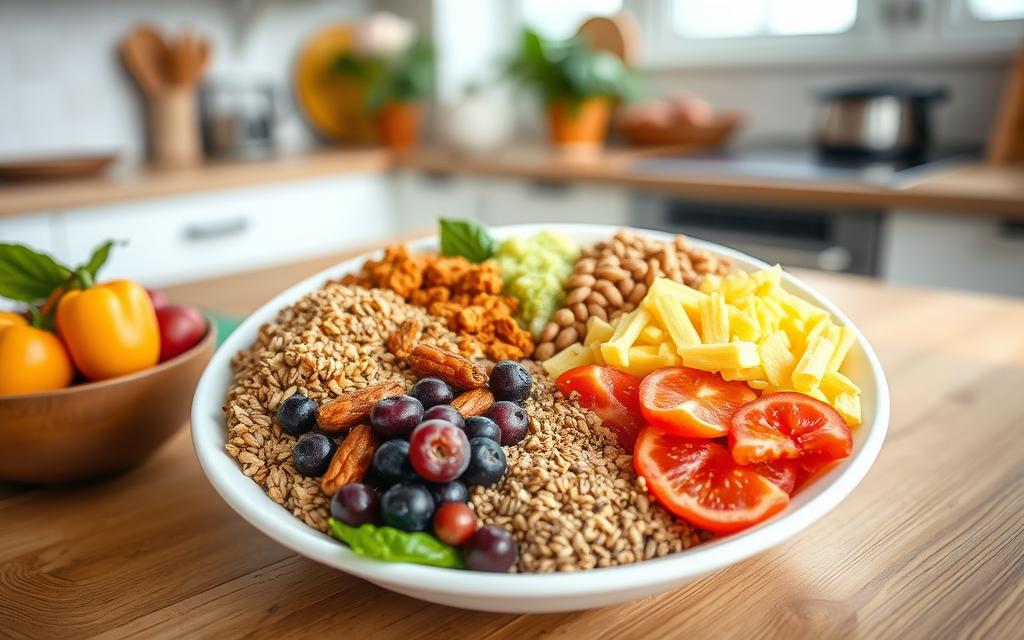When we walk through grocery stores, we see many labels saying “low carb” or “high carb.” This makes us wonder about carbs in our diets. Some think all carbs are bad, but that’s not true. Carbs are key for our health, giving us energy like proteins and fats do.
It’s important to know not all carbs are bad. Many are good for us. Experts say we should get about 50% of our calories from carbs like fruits, veggies, grains, and legumes1. This shows we don’t have to cut out carbs completely.
Let’s look into carbs’ role in our diets. We’ll see the types and how they affect our health. Our choices can make carbs good or bad.
Key Takeaways
- Carbohydrates are a key macronutrient contributing approximately 50% of our caloric intake.
- Not all carbs are created equal; understanding the differences between simple and complex carbohydrates is essential.
- Excess carbohydrate intake can lead to health issues, including elevated blood sugar levels.
- Complex carbs are generally healthier and help in controlling cravings and supporting weight management.
- Embracing healthy carbs can significantly enhance our energy levels and overall health.
Understanding Carbohydrates and Their Role in Our Diet
Carbohydrates are key nutrients that fuel our bodies. They come in three types: starches, sugars, and fiber2. It’s good to have healthy carbs make up half of our meals3. Whole grains should be about one fourth of our meals3.
Choosing whole grains boosts our health and energy. They are packed with nutrients.
Whole fruits are better than juice. An orange has more fiber and less sugar than orange juice3. This shows why we should pick whole fruits over juice.
Potatoes might be common, but they can lead to weight gain. Beans are better because they digest slowly3. Eating a variety of whole foods helps us get the carbs we need in a healthy way.
The Body’s Primary Source of Energy: Glucose from Carbs
Our body mainly uses glucose, made from carbs, as a key energy source. We should eat 45% to 65% of our daily calories as carbs, about 275 grams for a 2,000-calorie diet4. Most carbs we eat get broken down into glucose and then released into our blood5.
Carb-rich foods give us quick energy, great for our brain and body. Our liver holds about 100 grams of glycogen, helping keep blood sugar stable5. Our muscles can store up to 500 grams of glycogen, depending on the person5.
If we don’t get enough glucose, our body might use fat or protein for energy. This isn’t good for our health. It’s important to eat diets low in unnecessary sugars and high in fiber. Fiber helps with digestion, lowers cholesterol, and keeps blood sugar in check4.
The Importance of Carbs for Brain Function
The brain needs a lot of energy, about 130 grams of carbohydrates daily for it to work well6. This is about 40% of what an adult eats every day. Even though it’s only 2% of our body’s weight, it uses 20% of our carbs’ energy6. Carbs help us remember things and keep our mood stable.
Carbs turn into glucose, which is what our brain runs on. It can’t use protein or fats because of the blood-brain barrier7. If we don’t get enough glucose, we might feel irritable and have trouble focusing7. Keeping glucose levels steady is key for our mood and mental sharpness.
Complex carbs give us glucose slowly because of their fiber. This helps keep our brain’s energy steady7. Simple carbs, on the other hand, give us a quick energy boost but then crash7.
What we eat affects our brain a lot. For example, carbs help make serotonin, which improves mood. But eating too much sugar can hurt our brain’s ability to learn and remember6. It’s important to eat a balanced diet with healthy carbs to keep our brain working well.

| Carbohydrate Type | Speed of Breakdown | Energy Provided |
|---|---|---|
| Complex Carbohydrates | Slow | Steady and sustained |
| Simple Carbohydrates | Fast | Quick but short-lived |
Types of Carbohydrates: Simple vs. Complex
Understanding the difference between simple and complex carbs is key for our health. Simple carbs, or sugars, are quickly digested, causing blood sugar spikes. They are found in foods like raw sugar, brown sugar, and fruit juice concentrate. This can lead to a quick energy boost followed by a crash.
Research shows that simple carbs can make us feel less alert and more tired soon after eating8. Eating too much of them can cause weight gain and increase the risk of chronic diseases9
Defining Simple Carbs and Their Effects
Simple carbs include sugars like glucose, fructose, and sucrose. They give quick energy but don’t keep us full for long. Studies link them to increased fatigue8.
The American Heart Association advises limiting added sugars to 25 grams a day for women and 36 grams for men10. Too much of simple carbs can harm our health.
What Are Complex Carbs and Why They Matter
Complex carbs have longer sugar chains that the body digests slowly. This slow digestion gives us steady energy and keeps blood sugar levels balanced. Foods like quinoa, barley, and brown rice are good sources of complex carbs.
These carbs are more filling and provide important nutrients. They support our health and wellness910. Eating fiber-rich foods like fruits and vegetables helps us meet our daily fiber needs910. Complex carbs help lower the risk of diseases like type 2 diabetes and heart disease, making them essential for a healthy diet.
How Carbs Provide Fuel for Physical Activity
Carbohydrates are key for our physical activities, helping us perform better and longer. They are stored as glycogen in our muscles, ready to be used for energy. When we do low- to moderate-intensity activities, carbs and fats work together for energy. But at high intensities, carbs are the main source of energy for our muscles11.

It’s important to eat carbs at the right time for best performance and recovery. Eating carbs before working out helps fill up glycogen stores, giving us the energy we need. After hard workouts, our body still needs carbs to refill glycogen stores and help recover; a 3:1 carb-to-protein ratio can really help12.
The amount of carbs we need changes based on how active we are. For example, athletes doing long, hard workouts might need 30-60 grams of carbs per hour13. A fit person can keep going for hours at a moderate pace, but high-intensity activities can make us tired in 1-2 hours because of glycogen use13.
| Activity Level | Carbohydrate Intake (g/kg) | Duration |
|---|---|---|
| Low-Intensity Exercise | 3-5 g/kg | Up to 1 hour |
| Moderate to High Intensity Non-Endurance | 5-7 g/kg | 1 hour per day |
| High-Intensity Endurance Exercise | 6-10 g/kg | 1-3 hours per day |
| Extreme Commitment | 8-12 g/kg | 4-5 hours per day |
As we try to do more, knowing how carbs work is crucial. By paying attention to the types and timing of carbs, we can boost our performance and recovery. This helps us get the most out of every workout.
Why Not All Carbs Are Created Equal
Not all carbs are the same when it comes to health. Processed sugars can harm us by causing blood sugar spikes. This can lead to diseases like diabetes and heart disease14. On the other hand, we should eat more whole grains and fiber-rich foods.
The Impact of Processed Sugars on Health
Many foods, like candies and sugary drinks, have a lot of processed sugars. These foods give us quick energy but can cause weight gain and health problems14. In the U.S., only about 5% of carbs come from whole grains, showing a big need for better choices15.
Choosing Healthy Carb Sources
We should choose healthy carbs for better health. Whole grains, fruits, and veggies are great because they give us nutrients and energy that lasts. Studies show women who eat whole grains daily are healthier and live longer15.
The Surgeon General suggests eating three whole grain servings a day. But most Americans only get half of that15.

We should also look for foods with enough fiber. Bread should have at least 3 grams of fiber per slice, and cereals should have 5 or more grams per serving15. By choosing wisely between simple and complex carbs, we can make better food choices.
Recommended Daily Carb Intake for Adults
Adults need a certain amount of carbs to stay energized and healthy. Studies show that we should eat at least 130 grams of carbs daily16. This makes up about 25% of our daily calories if we follow a 2,000 calorie diet16.
The Dietary Guidelines for Americans suggest carbs should be 45% to 65% of our daily calories. This means we should aim for 225 to 325 grams of carbs each day1617.
Our carb needs can change based on our age, gender, and how active we are. The average American eats around 250 grams of carbs, which might be too much for some, like those with diabetes17. So, it’s important to know how much we need and follow carb guidelines to reach our health goals.
Eating more high-fiber foods like whole fruits, veggies, and grains is a good idea. They give us important nutrients and can help us avoid gaining weight16. Also, try to limit added sugars to less than 10% of our daily calories16. Tailoring our carb intake can improve our health and well-being.

| Daily Caloric Intake | Carbohydrate Percentage | Grams of Carbohydrates |
|---|---|---|
| 2,000 calories | 45% – 65% | 225 – 325 grams |
| 2,000 calories | 25% | 130 grams (minimum) |
| 300 grams (reference) | 12% DV | 37 grams |
The Role of Carbs in Weight Management
Understanding carbs is key to managing weight. They give our bodies the energy we need for daily tasks and exercise. Eating the right carbs, like those high in fiber, helps keep our blood sugar stable18. This also makes us feel full, which helps control hunger and lower calorie intake19.
The Dietary Guidelines for Americans recommend 45-65% of our calories come from carbs. For a 2,000-calorie diet, that’s about 275 grams20. This balance supports our energy and can improve how well we exercise, which is vital for losing and keeping off weight18.
While low-carb diets might lead to quick weight loss, they’re hard to stick with long-term20. Instead of cutting carbs, focusing on their quality is better. Foods like whole grains, starchy veggies, and legumes help us manage weight and get the nutrients we need19.
Eating Low Carb: Short-Term Gains vs. Long-Term Health
Many people start a low carb diet to lose weight fast. Studies show it can help reduce fat and even help with Type 2 Diabetes. But, the diet’s benefits often fade after six months, making it hard to keep up21.
Low carb diets limit carbs to under 130 grams a day, which is less than 26% of a 2000-calorie diet21. They are high in fats and protein, unlike balanced diets. This shows a big difference in how we view weight management.
Right away, we might see good results. But, low carb diets can be bad for our health and gut over time21. They can make us tired and lead to nutrient deficiencies, harming our health.
Research suggests that healthy low-carb diets, full of plant-based proteins, slow down weight gain better than unhealthy ones22. A study of 123,332 healthy adults over 30 years found that younger, overweight, and less active people benefit more from healthy diets22.
When we aim for a healthy lifestyle, we should think about long-term health, not just quick weight loss. It’s important to balance our diet and focus on sustainable eating for lasting results.
Carb Counting: Is It Necessary?
Carb counting helps people, like those with diabetes, keep track of carbs. It lets us know how much we eat. This way, we can choose better foods and stay healthy.
Strategies for Effective Carb Counting
First, learn about carb servings. One serving has about 15 grams of carbs. This makes planning meals easier23.
A small baked potato has 30 grams of carbs, or 2 servings24. A daily diet of 1,800 calories might include 200 grams of carbs, or 13 servings24.
Spread carbs evenly in your meals. Aim for 60 grams per meal and 15-20 grams for snacks25. Keeping a food log helps track carbs and how they affect blood sugar.
Knowing what foods have carbs is key. For example:
| Food Item | Carbohydrate Content |
|---|---|
| Bread (1 slice) | 15 grams |
| Bagel (large) | 45 grams |
| Pancakes (2 small) | 30 grams |
| Cherios (1 cup) | 20 grams |
| Oatmeal (1 cup) | 30 grams |
| Rice (1 cup) | 45 grams |
| Medium baked potato (1 cup) | 30 grams |
Knowing carb content helps us make better food choices. By focusing on whole foods and not just calories, we can manage our diet better. This makes tracking carbs easier and helps us stay healthy.
Common Myths Surrounding Carbohydrates
Many people believe carbohydrate myths that lead to carbs misconceptions. One myth is that carbs make you gain weight. But, whole grains, fruits, and veggies are full of nutrients we need. The Dietary Guidelines say carbs should make up 45-65% of our calories26.
But, eating too many simple carbs in processed foods can lead to weight gain. This is because they often have a lot of added sugars26.
Some think cutting carbs is the best way to stay healthy. But, eating whole grains can lower the risk of diabetes and heart disease27. Also, foods high in fiber can make you feel full longer, helping you avoid fatigue and low energy26.
It’s important to know not all carbs are the same. Foods like cakes and cookies can make you gain weight. But, carbs like potatoes and bananas are full of nutrients like potassium, which is good for your heart26.
High-fiber foods are also good for you. They help with weight management and give you important vitamins and minerals27.
Knowing the truth about carbohydrate myths helps us make better food choices. It’s key to watch portion sizes and pick whole foods to keep blood sugar stable. This way, carbs can be a good part of our diet, not something to fear.
| Myth | Fact |
|---|---|
| All carbs lead to weight gain | Whole grains and complex carbs can aid in weight maintenance and provide essential nutrients. |
| Cutting carbs entirely improves health | Whole grain intake reduces risks of chronic diseases and supports overall health. |
| Simple carbs are always bad | Not all simple carbs are harmful; some, like fruits, provide essential nutrients. |
| High-fiber foods are unnecessary | High-fiber foods support fullness and help reduce cravings for unhealthy snacks. |
Health Risks Associated with Avoiding Carbs
Not eating carbs can harm your health. Some think cutting carbs helps them lose weight fast. But, the dangers of avoiding carbs often outweigh the benefits.
Very low-carb diets limit carbs to less than 10% of what you eat. This means you get only 20 to 50 grams of carbs daily28. Such a low intake can lead to missing out on nutrients from fruits, veggies, and whole grains. These foods are key for staying healthy.
When you start a very low-carb diet, your body goes into ketosis. This change takes about 2 to 3 weeks. During this time, you might feel weak and tired, like you have the flu28.
Some people also get sick to their stomach, feeling nauseous, in pain, or vomiting. This is because they’re not getting enough nutrients28. These symptoms show the digestive problems that can come with low-carb diets.
Thinking about the long-term effects of avoiding carbs is important. Eating too few carbs can cause constipation, but this usually goes away in a few weeks28. Also, diets low in carbs might lead to eating too much saturated fat. This can increase the risk of heart disease29.
Psychologically, avoiding carbs can make you crave food more and worry about what you eat. Studies show that low-carb diets can lower serotonin levels. This hormone imbalance can affect your mood and mental health28. This shows how extreme diet changes can impact your well-being.
Conclusion
Understanding carbs is key to a balanced diet. They are the body’s main energy source, giving 4 calories per gram. The FDA suggests we eat 275 grams of carbs daily for a 2,000-calorie diet30.
This shows how important it is to choose healthy carbs. We should eat whole grains, veggies, and beans. These foods help lower the risk of diseases like type 2 diabetes and heart disease30.
It’s also crucial to watch out for added sugars. Too much can harm our health and make our diets less nutritious31.
By picking healthy carbs and avoiding processed sugars, we can improve our health. Eating the right carbs helps us live better, longer lives.
FAQ
Are all carbohydrates bad for me?
No, not all carbs are bad. It’s key to know the difference between good carbs and bad ones. Good carbs are found in whole grains, fruits, and veggies. Bad carbs are in processed foods. Knowing this helps us make better food choices.
What is the difference between simple and complex carbohydrates?
Simple carbs are sugars that digest fast, giving quick energy but can raise blood sugar. Complex carbs digest slower, giving steady energy and nutrients. They’re better for our health.
How do carbohydrates affect my energy levels?
Our body turns carbs into glucose, which is our main energy source. Eating healthy carbs keeps our energy up all day. This is true for our brain and when we’re active.
Can I still lose weight if I eat carbohydrates?
Yes, you can lose weight eating carbs. Healthy carbs help keep blood sugar stable, make you feel full, and give energy for workouts. This helps burn fat.
What are some healthy sources of carbohydrates?
Good carb sources are whole grains like quinoa and brown rice, legumes, veggies, and fruits. These give us nutrients, unlike refined carbs in sugary snacks and white bread.
Is carb counting necessary for everyone?
Carb counting helps those with diabetes, but it’s not for everyone. Instead, focus on eating whole, nutritious foods. This supports a healthy lifestyle.
What are the risks of a low-carb diet?
Low-carb diets can cause nutrient deficiencies, digestive problems, and fatigue. It’s important to eat healthy carbs for energy and well-being.
How can carbohydrates benefit my brain function?
Our brain needs glucose for fuel. Eating healthy carbs helps keep blood sugar steady. This improves mood, memory, and mental clarity.
How can I include more carbohydrates in my diet safely?
To safely add more carbs, choose whole foods like grains, fruits, and veggies. Avoid refined sugars and processed foods. This supports health and gives us needed nutrients.
What is the recommended daily carbohydrate intake?
The Dietary Guidelines say 45-65% of daily calories should be carbs. This is about 225-325 grams on a 2,000-calorie diet. Needs vary based on activity and age.
